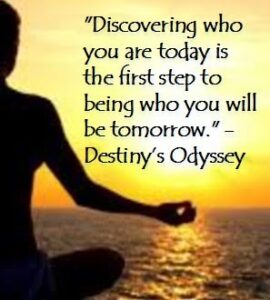 Tips on how to carry out self-discovery
Tips on how to carry out self-discovery
- Exposure/Engagement
This is the first step in the process of self-discovery. It is the exploration stage; where you get engaged with several activities, communities and relationships. At times you still need other people and the environment to show you what you have inside you.
There are so many things you can do that you haven’t done or don’t know you could do because demand has not been placed on them by the environment. From school clubs and societies, to church service groups, and any community that gives you the opportunity to relate with new people and try new things, there are so many ways which you could get engaged.
From engagement you will begin to find if leadership is your thing or not; your anger and patience will be put to test; your ability to handle stress, your creativity, your passion and response to various situations will all be exposed and that will give you a clearer picture about yourself that you didn’t have before.
From these relationships also, people begin to tell you about other aspects of yourself that you still aren’t seeing. They will tell you in playful comments or you will notice it in nature of responsibility they keep assigning to you as against others.
From engagements and relationships, you will begin to notice that some abilities you have and have always taken for granted are not common to everyone because you will see others do them very poorly.
Note that the exploration stage also includes learning from books, movies and the internet. The more your understanding increases about life and the world, the clearer your potential and weaknesses become to you. You will also begin to see how your strength should function in the bigger community and how you should harness it.
- Spending Quality Time Alone to carry out self-analysis and examination
After your exploration (exposure and engagement), the next phase of the cycle is spending time alone to sieve from all you have heard and learnt, what really applies to you. From all that people have said you could do, you begin to look deeply to see if you can truly do them.
From all you could do, you also assess to know which are your major strengths what you can only manage to do excellently. From all you can do, you also begin separate those that brought you the highest level of satisfaction and feeling of fulfillment from those you didn’t enjoy.
From all, you sieve the ones that stirred your passion and you would love to do over and over again.
Exposure and engagement without spending time alone will not help you discover yourself; it will only keep you engaged in so many activities and you might soon have a burnout.
It is in spending time alone that you examine your weaknesses and identify which ones you need to work on and which you need to accept.
It is in spending time alone that you plan a course of action for working on those weaknesses: you find the causes of the weaknesses and limitation; you seek to understand the nature of manifestation of those weaknesses; you seek to identify what triggers and suppresses your weaknesses and strength, and identify what can be done from where you are to the next step of change or development.
It is in spending time alone that you find your own voice of satisfaction, to understand what it is saying and compare it to all the options you have gotten from your engagement and exposure. It is only in spending time alone that you can truly discover who you are.
- Progressive journalling
As you look deep within yourself while spending time alone, you then begin to write down all that you have discovered. If you commit to writing down all what you find out about yourself, make the process faster and more effective.
Your thoughts become clearer to you when you try to put them on paper than when you just have them in your head. You might think you know when it’s just in your head but it is when you write it down that you truly know what it is you are thinking.
Also, writing down saves you from forgetting the discoveries you’ve made about yourself. This point is called progressive journaling because you don’t just write once and leave it. Rather, you keep writing as you make the discoveries.
Your lists could include things you like, things you thought you could do, things you hate, things you feel you couldn’t do etc. As you continue in various engagements and spending time alone, you might discover you don’t like some things you thought you liked and that you weren’t passionate about all the things you thought you were passionate about.
- Seek a supportive atmosphere
The more time we spend in the presence of supportive family, friends, lovers, and communities, the sooner we will be likely to discover our true nature. This is because warm and encouraging atmospheres facilitate feelings of inner security while providing the freedom to have our own feelings and thoughts (Horney, 1950).
To this end, here are some ideas to consider:
- Seek quiet spaces and time out to facilitate reflection or journaling.
- Join a social group whose interests and passions align with your own, such as a painting, writing, or poetry group.
- Find a coach or therapist for a safe space to pursue self-discovery.
- Set boundaries with people who discourage your individuality, negatively affect your emotions, or put you down.
- Seek the company of people who inspire you, make you feel positive, and challenge your perception of yourself.